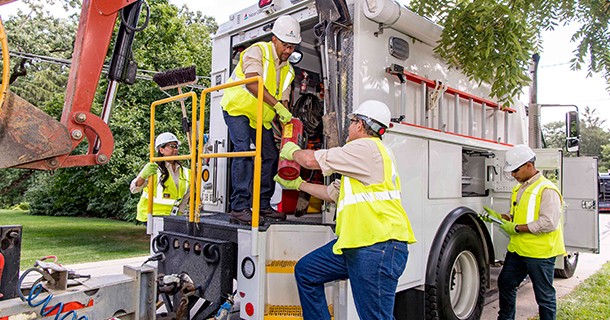Natural Gas Vehicles
About Natural Gas Vehicles
Natural Gas Vehicles (NGVs) are powered by compressed natural gas (CNG) or liquefied natural gas (LNG). Both are cleaner, safer and less expensive than traditional fuels. New developments in engine and vehicle technology, more stringent air quality regulations, and government incentives make this choice increasingly attractive.
Of the more than 15 million NGVs worldwide and 135,000 on U.S. roads, most are buses, refuse trucks and light- and medium-duty fleet vehicles, but manufacturers are now producing several models suitable for consumer use. Also, there are more than 100 models of gasoline-powered vehicles which can be converted to operate on CNG.
Our nation has the most extensive natural gas distribution system of any country in the world, making it feasible to install CNG fueling equipment at existing gas stations supplied from existing natural gas lines. There are more than 1,300 NGV fueling stations available now and the number is growing fast. In addition, convenient home refueling with CNG home refueling appliances is already available with more appliances expected on the market soon.
Are NGVs right for your lifestyle or business? Contact Christopher Sala at 630.388.3146 or cbsala@southernco.com for more information. Nicor Gas can provide you with clean, affordable natural gas to fuel your vehicles and assist you with evaluating the options.
NGV Business Fleets
Business fleet owners are switching to compressed natural gas now more than ever.
Learn more about how natural gas vehicles can help your businessHow Natural Gas Vehicles Work
Light-duty natural gas vehicles work much like gasoline-powered vehicles. In a CNG fuel system, high-pressure natural gas moves from the storage tank to the engine where its pressure is reduced to the engine’s required fuel injection system pressure. After the natural gas is injected into the engine, the fuel-air mixture is compressed and ignited by a spark plug. The expanding gases propel the vehicle.
Some heavy-duty vehicles use spark-ignited natural gas systems, but other systems exist as well. High-pressure direct injection engines burn natural gas in a compression-ignition (diesel) cycle. Heavy-duty engines also can burn diesel and natural gas in a dual-fuel system.
Natural Gas Vehicle Safety
Natural gas in an inherently safe fuel and, unlike gasoline, it dissipates into the atmosphere in the event of an accidental release. The high ignition temperature and limited flammability range make accidental ignition or combustion of natural gas unlikely.
CNG vehicle storage cylinders and other fuel system components are manufactured to strict standards and installed in accordance with applicable codes. The industry has an excellent safety record, especially when compared to other fuel types.
Benefits of Natural Gas Vehicles
Proven and Reliable
There are nearly 15 million NGVs are in use worldwide, with more than 135,000 in the U.S.
Fuel Savings
The U.S. is the major producer of natural gas. This abundant domestic supply has driven down the price of natural gas, ensuring that the price will remain below that of oil or other alternative energy sources. Compressed Natural Gas (CNG) currently saves up to 50% over conventional fuels, and CNG vehicles are available for all types of applications, including business fleets and vehicles for personal use.
Environmental Benefits
CNG vehicles produce up to 90% fewer emissions than gasoline or diesel and reduce greenhouse gases 20-29% over diesel and gasoline.
Reduced Maintenance Costs
In some cases, oil change intervals for NGVs may be extended since natural gas burns cleaner than gasoline or diesel. Also, because natural gas engines have practically no carbon build-up, it is not uncommon for them to last longer than gasoline and diesel engines.
Quieter
Heavy-duty NGVs have an 80-90% lower noise level than comparable diesel vehicles.
Incentives
Significant federal and/or state tax credits and other incentives are often available for converting to NGVs.
Buses/Mass Transit, Service Provider Fleets
Transit agencies, airport and hotel shuttles, taxis, and service provider fleets across the country are increasingly switching to NGVs.
Natural Gas Vehicle Types
Applications
Natural Gas Vehicles (NGVs) are developed based on the same internal combustion engines as gasoline and diesel vehicles and the performance and fuel economy are comparable with those of equivalent conventional vehicles. There are three types of NGV engine applications:
- Dedicated – Vehicle application using only natural gas
- Bi-fuel – Light- or medium-duty application which uses natural gas or gasoline interchangeably
- Dual fuel – Heavy-duty application using a blend of natural gas and diesel simultaneously
Types of Forms
Natural gas can also be stored on the vehicle in two different forms:
- Compressed Natural Gas (CNG) – Natural gas is compressed to 3,600 psig but remains in a gaseous state. The fuel density is less than gasoline or diesel but the vehicle fuel storage cylinder(s) are sized to have enough on board fuel to achieve the necessary driving range. There are a multiple vehicle types using CNG in the light-, medium-, and heavy-duty classifications.
- Liquefied Natural Gas (LNG) – Natural gas is refrigerated to – 260 degrees F and is stored on the vehicle in a liquid state. This is generally only used in heavy-duty applications that need a greater range because the fuel occupies less space in liquid form. Most LNG vehicles operate like CNG vehicles because although the fuel is stored in liquid form it is then vaporized before being introduced to the engine.
Fueling for Natural Gas Vehicles
Compressed Natural Gas (CNG) saves up to 50% over conventional fuels, and CNG vehicles are available for all types of applications, including business fleets and vehicles for personal use.
Read more about CNG fueling



